Skip to main content
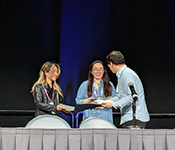 If you ask 10 different people to write a metaphor about time, you might get 10 unique responses. However, if you give the same prompt to 10 large language models (LLMs), you may end up receiving similar outputs across the board — almost like they are all part of an Artificial Hivemind. In a recent study, Allen School researchers introduced Infinity-chat, a benchmark dataset that allows for a systemic evaluation of the creative generation of artificial intelligence models. For revealing a critical limitation in LLMs, the team received the NeurIPS 2025 Best Paper Award. Read more →
If you ask 10 different people to write a metaphor about time, you might get 10 unique responses. However, if you give the same prompt to 10 large language models (LLMs), you may end up receiving similar outputs across the board — almost like they are all part of an Artificial Hivemind. In a recent study, Allen School researchers introduced Infinity-chat, a benchmark dataset that allows for a systemic evaluation of the creative generation of artificial intelligence models. For revealing a critical limitation in LLMs, the team received the NeurIPS 2025 Best Paper Award. Read more →
January 22, 2026
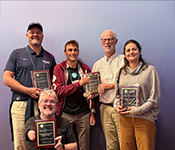 In a user study published in 2009, a team of UW researchers including Allen School professor emeritus Richard Ladner examined how participants with visual and motor disabilities select, adapt and use mobile devices in their everyday lives. Since then, their findings have helped guide new innovations in mobile device accessibility. The team’s paper received the SIGACCESS ASSETS Paper Impact Award, recognizing its “significant impact on computing and information technology that addresses the needs of persons with disabilities.” Read more →
In a user study published in 2009, a team of UW researchers including Allen School professor emeritus Richard Ladner examined how participants with visual and motor disabilities select, adapt and use mobile devices in their everyday lives. Since then, their findings have helped guide new innovations in mobile device accessibility. The team’s paper received the SIGACCESS ASSETS Paper Impact Award, recognizing its “significant impact on computing and information technology that addresses the needs of persons with disabilities.” Read more →
January 7, 2026
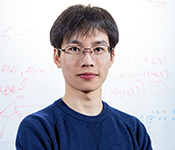 From developing recyclable electronics to leveraging artificial intelligence to estimate carbon footprints and provide personalized health insights, Allen School Ph.D. student Zhihan Zhang is interested in tackling the challenge of sustainability from multiple fronts. To support his work, Zhang was awarded a 2025 Google Ph.D. Fellowship in health research. The fellowship recognizes exceptional graduate students from around the world who represent “the next generation of scientists focused on critical foundational science.”
Read more →
From developing recyclable electronics to leveraging artificial intelligence to estimate carbon footprints and provide personalized health insights, Allen School Ph.D. student Zhihan Zhang is interested in tackling the challenge of sustainability from multiple fronts. To support his work, Zhang was awarded a 2025 Google Ph.D. Fellowship in health research. The fellowship recognizes exceptional graduate students from around the world who represent “the next generation of scientists focused on critical foundational science.”
Read more →
December 17, 2025
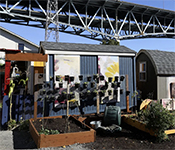 Modern Internet of Things (IoT) technologies such as smart home devices, sensors and security cameras have transformed how we interact with our physical environments. As University of Washington researchers discovered, they also have the potential to help residents living in tiny house villages, a type of emergency shelter for those experiencing homelessness. To learn more about the team’s findings, we spoke with Allen School professor Kurtis Heimerl and Allen School postdoc Esther Han Beol Jang (Ph.D., ‘24). Read more →
Modern Internet of Things (IoT) technologies such as smart home devices, sensors and security cameras have transformed how we interact with our physical environments. As University of Washington researchers discovered, they also have the potential to help residents living in tiny house villages, a type of emergency shelter for those experiencing homelessness. To learn more about the team’s findings, we spoke with Allen School professor Kurtis Heimerl and Allen School postdoc Esther Han Beol Jang (Ph.D., ‘24). Read more →
December 4, 2025
 To help make datasets easier to understand and examine, in 2015, a team of researchers led by Allen School professor Jeffrey Heer introduced Voyager, a system that automatically generates and recommends charts and visualizations based on statistical and perceptual measures — allowing users to efficiently explore different parts of the dataset they may not have discovered before. At IEEE VIS 2025 earlier this month in Vienna, Austria, Heer and his co-authors were recognized with the InfoVis 10-Year Test of Time Award for the Voyager paper’s lasting impact on the field. Read more →
To help make datasets easier to understand and examine, in 2015, a team of researchers led by Allen School professor Jeffrey Heer introduced Voyager, a system that automatically generates and recommends charts and visualizations based on statistical and perceptual measures — allowing users to efficiently explore different parts of the dataset they may not have discovered before. At IEEE VIS 2025 earlier this month in Vienna, Austria, Heer and his co-authors were recognized with the InfoVis 10-Year Test of Time Award for the Voyager paper’s lasting impact on the field. Read more →
November 19, 2025
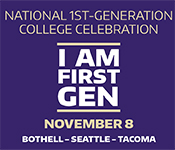 At the Allen School, 22% of Fall 2025 undergraduate students are first generation, or one of the first in their family to pursue a bachelor’s degree. For first-gen students, navigating the twists and turns of higher education without a roadmap can be a daunting challenge. Still, these students have persevered to figure it out on their own or leverage resources such as the Allen School’s first-gen student group,
GEN1, to help them find their way. In honor of the National First-Generation College Celebration on November 8, we asked students and faculty to share their experience being first and what advice they have for others still embarking on their first-gen journey. Here are some of their stories. Read more →
At the Allen School, 22% of Fall 2025 undergraduate students are first generation, or one of the first in their family to pursue a bachelor’s degree. For first-gen students, navigating the twists and turns of higher education without a roadmap can be a daunting challenge. Still, these students have persevered to figure it out on their own or leverage resources such as the Allen School’s first-gen student group,
GEN1, to help them find their way. In honor of the National First-Generation College Celebration on November 8, we asked students and faculty to share their experience being first and what advice they have for others still embarking on their first-gen journey. Here are some of their stories. Read more →
November 10, 2025
 From a robotic arm that learns how to pick up new objects in real time, to a model that converts 2D videos into 3D virtual reality, to a curious chatbot that adapts to its users, to machine learning techniques for decoding the brain (and so much more), the 2025 edition of the annual Research Showcase and Open House highlighted the breadth and depth of computing innovation coming out of the Allen School. Read more →
From a robotic arm that learns how to pick up new objects in real time, to a model that converts 2D videos into 3D virtual reality, to a curious chatbot that adapts to its users, to machine learning techniques for decoding the brain (and so much more), the 2025 edition of the annual Research Showcase and Open House highlighted the breadth and depth of computing innovation coming out of the Allen School. Read more →
November 6, 2025
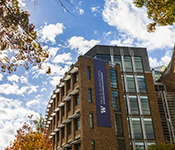 Each year, the MIT Technology Review recognizes science and technology trailblazers whose work is helping solve global problems. Three members of the Allen School community were named part of this year’s MIT Technology Review Innovators Under 35 Asia Pacific — professors Simon Shaolei Du and Ranjay Krishna, along with alum Sewon Min (Ph.D., ‘24), now a faculty member at University of California, Berkeley and research scientist at the Allen Institute for AI (Ai2). The three were recognized as pioneers for their innovative research that is advancing our understanding of artificial intelligence, large language models, computer vision and more. Read more →
Each year, the MIT Technology Review recognizes science and technology trailblazers whose work is helping solve global problems. Three members of the Allen School community were named part of this year’s MIT Technology Review Innovators Under 35 Asia Pacific — professors Simon Shaolei Du and Ranjay Krishna, along with alum Sewon Min (Ph.D., ‘24), now a faculty member at University of California, Berkeley and research scientist at the Allen Institute for AI (Ai2). The three were recognized as pioneers for their innovative research that is advancing our understanding of artificial intelligence, large language models, computer vision and more. Read more →
October 29, 2025
 In his research, Allen School professor Baris Kasikci focuses on developing techniques for building systems that are both efficient and have a strong foundation of dependability, with an emphasis on real-world technical and societal impact. At the 55th Annual IEEE/IFIP International Conference on Dependable Systems and Networks (DSN 2025) in June, Kasikci was recognized with the Rising Star in Dependability Award for “his impressive track-record and contributions in the field of dependable systems, including multiple publications in highly regarded venues, and influence on current industry practice.” Read more →
In his research, Allen School professor Baris Kasikci focuses on developing techniques for building systems that are both efficient and have a strong foundation of dependability, with an emphasis on real-world technical and societal impact. At the 55th Annual IEEE/IFIP International Conference on Dependable Systems and Networks (DSN 2025) in June, Kasikci was recognized with the Rising Star in Dependability Award for “his impressive track-record and contributions in the field of dependable systems, including multiple publications in highly regarded venues, and influence on current industry practice.” Read more →
October 22, 2025
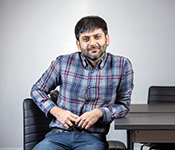 To help network engineers and operators ensure that their networks operate exactly as they intend, Allen School professor and alum Ratul Mahajan (Ph.D., ‘05) and his collaborators introduced Batfish, an open source network configuration analysis tool that can find errors and ensure the accuracy of planned network configurations, helping to prevent costly outages. At the ACM Special Interest Group on Data Communication (SIGCOMM) conference last month, Batfish was recognized with the SIGCOMM Networking Systems Award for its “significant impact on the world of computer networking.”
Read more →
To help network engineers and operators ensure that their networks operate exactly as they intend, Allen School professor and alum Ratul Mahajan (Ph.D., ‘05) and his collaborators introduced Batfish, an open source network configuration analysis tool that can find errors and ensure the accuracy of planned network configurations, helping to prevent costly outages. At the ACM Special Interest Group on Data Communication (SIGCOMM) conference last month, Batfish was recognized with the SIGCOMM Networking Systems Award for its “significant impact on the world of computer networking.”
Read more →
October 8, 2025
Older Posts »
 If you ask 10 different people to write a metaphor about time, you might get 10 unique responses. However, if you give the same prompt to 10 large language models (LLMs), you may end up receiving similar outputs across the board — almost like they are all part of an Artificial Hivemind. In a recent study, Allen School researchers introduced Infinity-chat, a benchmark dataset that allows for a systemic evaluation of the creative generation of artificial intelligence models. For revealing a critical limitation in LLMs, the team received the NeurIPS 2025 Best Paper Award. Read more →
If you ask 10 different people to write a metaphor about time, you might get 10 unique responses. However, if you give the same prompt to 10 large language models (LLMs), you may end up receiving similar outputs across the board — almost like they are all part of an Artificial Hivemind. In a recent study, Allen School researchers introduced Infinity-chat, a benchmark dataset that allows for a systemic evaluation of the creative generation of artificial intelligence models. For revealing a critical limitation in LLMs, the team received the NeurIPS 2025 Best Paper Award. Read more →

 If you ask 10 different people to write a metaphor about time, you might get 10 unique responses. However, if you give the same prompt to 10 large language models (LLMs), you may end up receiving similar outputs across the board — almost like they are all part of an Artificial Hivemind. In a recent study, Allen School researchers introduced Infinity-chat, a benchmark dataset that allows for a systemic evaluation of the creative generation of artificial intelligence models. For revealing a critical limitation in LLMs, the team received the NeurIPS 2025 Best Paper Award. Read more →
If you ask 10 different people to write a metaphor about time, you might get 10 unique responses. However, if you give the same prompt to 10 large language models (LLMs), you may end up receiving similar outputs across the board — almost like they are all part of an Artificial Hivemind. In a recent study, Allen School researchers introduced Infinity-chat, a benchmark dataset that allows for a systemic evaluation of the creative generation of artificial intelligence models. For revealing a critical limitation in LLMs, the team received the NeurIPS 2025 Best Paper Award. Read more →
 In a user study published in 2009, a team of UW researchers including Allen School professor emeritus Richard Ladner examined how participants with visual and motor disabilities select, adapt and use mobile devices in their everyday lives. Since then, their findings have helped guide new innovations in mobile device accessibility. The team’s paper received the SIGACCESS ASSETS Paper Impact Award, recognizing its “significant impact on computing and information technology that addresses the needs of persons with disabilities.” Read more →
In a user study published in 2009, a team of UW researchers including Allen School professor emeritus Richard Ladner examined how participants with visual and motor disabilities select, adapt and use mobile devices in their everyday lives. Since then, their findings have helped guide new innovations in mobile device accessibility. The team’s paper received the SIGACCESS ASSETS Paper Impact Award, recognizing its “significant impact on computing and information technology that addresses the needs of persons with disabilities.” Read more →
 From developing recyclable electronics to leveraging artificial intelligence to estimate carbon footprints and provide personalized health insights, Allen School Ph.D. student Zhihan Zhang is interested in tackling the challenge of sustainability from multiple fronts. To support his work, Zhang was awarded a 2025 Google Ph.D. Fellowship in health research. The fellowship recognizes exceptional graduate students from around the world who represent “the next generation of scientists focused on critical foundational science.”
Read more →
From developing recyclable electronics to leveraging artificial intelligence to estimate carbon footprints and provide personalized health insights, Allen School Ph.D. student Zhihan Zhang is interested in tackling the challenge of sustainability from multiple fronts. To support his work, Zhang was awarded a 2025 Google Ph.D. Fellowship in health research. The fellowship recognizes exceptional graduate students from around the world who represent “the next generation of scientists focused on critical foundational science.”
Read more →
 Modern Internet of Things (IoT) technologies such as smart home devices, sensors and security cameras have transformed how we interact with our physical environments. As University of Washington researchers discovered, they also have the potential to help residents living in tiny house villages, a type of emergency shelter for those experiencing homelessness. To learn more about the team’s findings, we spoke with Allen School professor Kurtis Heimerl and Allen School postdoc Esther Han Beol Jang (Ph.D., ‘24). Read more →
Modern Internet of Things (IoT) technologies such as smart home devices, sensors and security cameras have transformed how we interact with our physical environments. As University of Washington researchers discovered, they also have the potential to help residents living in tiny house villages, a type of emergency shelter for those experiencing homelessness. To learn more about the team’s findings, we spoke with Allen School professor Kurtis Heimerl and Allen School postdoc Esther Han Beol Jang (Ph.D., ‘24). Read more →
 To help make datasets easier to understand and examine, in 2015, a team of researchers led by Allen School professor Jeffrey Heer introduced Voyager, a system that automatically generates and recommends charts and visualizations based on statistical and perceptual measures — allowing users to efficiently explore different parts of the dataset they may not have discovered before. At IEEE VIS 2025 earlier this month in Vienna, Austria, Heer and his co-authors were recognized with the InfoVis 10-Year Test of Time Award for the Voyager paper’s lasting impact on the field. Read more →
To help make datasets easier to understand and examine, in 2015, a team of researchers led by Allen School professor Jeffrey Heer introduced Voyager, a system that automatically generates and recommends charts and visualizations based on statistical and perceptual measures — allowing users to efficiently explore different parts of the dataset they may not have discovered before. At IEEE VIS 2025 earlier this month in Vienna, Austria, Heer and his co-authors were recognized with the InfoVis 10-Year Test of Time Award for the Voyager paper’s lasting impact on the field. Read more →
 At the Allen School, 22% of Fall 2025 undergraduate students are first generation, or one of the first in their family to pursue a bachelor’s degree. For first-gen students, navigating the twists and turns of higher education without a roadmap can be a daunting challenge. Still, these students have persevered to figure it out on their own or leverage resources such as the Allen School’s first-gen student group,
GEN1, to help them find their way. In honor of the National First-Generation College Celebration on November 8, we asked students and faculty to share their experience being first and what advice they have for others still embarking on their first-gen journey. Here are some of their stories. Read more →
At the Allen School, 22% of Fall 2025 undergraduate students are first generation, or one of the first in their family to pursue a bachelor’s degree. For first-gen students, navigating the twists and turns of higher education without a roadmap can be a daunting challenge. Still, these students have persevered to figure it out on their own or leverage resources such as the Allen School’s first-gen student group,
GEN1, to help them find their way. In honor of the National First-Generation College Celebration on November 8, we asked students and faculty to share their experience being first and what advice they have for others still embarking on their first-gen journey. Here are some of their stories. Read more →
 From a robotic arm that learns how to pick up new objects in real time, to a model that converts 2D videos into 3D virtual reality, to a curious chatbot that adapts to its users, to machine learning techniques for decoding the brain (and so much more), the 2025 edition of the annual Research Showcase and Open House highlighted the breadth and depth of computing innovation coming out of the Allen School. Read more →
From a robotic arm that learns how to pick up new objects in real time, to a model that converts 2D videos into 3D virtual reality, to a curious chatbot that adapts to its users, to machine learning techniques for decoding the brain (and so much more), the 2025 edition of the annual Research Showcase and Open House highlighted the breadth and depth of computing innovation coming out of the Allen School. Read more →
 Each year, the MIT Technology Review recognizes science and technology trailblazers whose work is helping solve global problems. Three members of the Allen School community were named part of this year’s MIT Technology Review Innovators Under 35 Asia Pacific — professors Simon Shaolei Du and Ranjay Krishna, along with alum Sewon Min (Ph.D., ‘24), now a faculty member at University of California, Berkeley and research scientist at the Allen Institute for AI (Ai2). The three were recognized as pioneers for their innovative research that is advancing our understanding of artificial intelligence, large language models, computer vision and more. Read more →
Each year, the MIT Technology Review recognizes science and technology trailblazers whose work is helping solve global problems. Three members of the Allen School community were named part of this year’s MIT Technology Review Innovators Under 35 Asia Pacific — professors Simon Shaolei Du and Ranjay Krishna, along with alum Sewon Min (Ph.D., ‘24), now a faculty member at University of California, Berkeley and research scientist at the Allen Institute for AI (Ai2). The three were recognized as pioneers for their innovative research that is advancing our understanding of artificial intelligence, large language models, computer vision and more. Read more →
 In his research, Allen School professor Baris Kasikci focuses on developing techniques for building systems that are both efficient and have a strong foundation of dependability, with an emphasis on real-world technical and societal impact. At the 55th Annual IEEE/IFIP International Conference on Dependable Systems and Networks (DSN 2025) in June, Kasikci was recognized with the Rising Star in Dependability Award for “his impressive track-record and contributions in the field of dependable systems, including multiple publications in highly regarded venues, and influence on current industry practice.” Read more →
In his research, Allen School professor Baris Kasikci focuses on developing techniques for building systems that are both efficient and have a strong foundation of dependability, with an emphasis on real-world technical and societal impact. At the 55th Annual IEEE/IFIP International Conference on Dependable Systems and Networks (DSN 2025) in June, Kasikci was recognized with the Rising Star in Dependability Award for “his impressive track-record and contributions in the field of dependable systems, including multiple publications in highly regarded venues, and influence on current industry practice.” Read more →
 To help network engineers and operators ensure that their networks operate exactly as they intend, Allen School professor and alum Ratul Mahajan (Ph.D., ‘05) and his collaborators introduced Batfish, an open source network configuration analysis tool that can find errors and ensure the accuracy of planned network configurations, helping to prevent costly outages. At the ACM Special Interest Group on Data Communication (SIGCOMM) conference last month, Batfish was recognized with the SIGCOMM Networking Systems Award for its “significant impact on the world of computer networking.”
Read more →
To help network engineers and operators ensure that their networks operate exactly as they intend, Allen School professor and alum Ratul Mahajan (Ph.D., ‘05) and his collaborators introduced Batfish, an open source network configuration analysis tool that can find errors and ensure the accuracy of planned network configurations, helping to prevent costly outages. At the ACM Special Interest Group on Data Communication (SIGCOMM) conference last month, Batfish was recognized with the SIGCOMM Networking Systems Award for its “significant impact on the world of computer networking.”
Read more →
